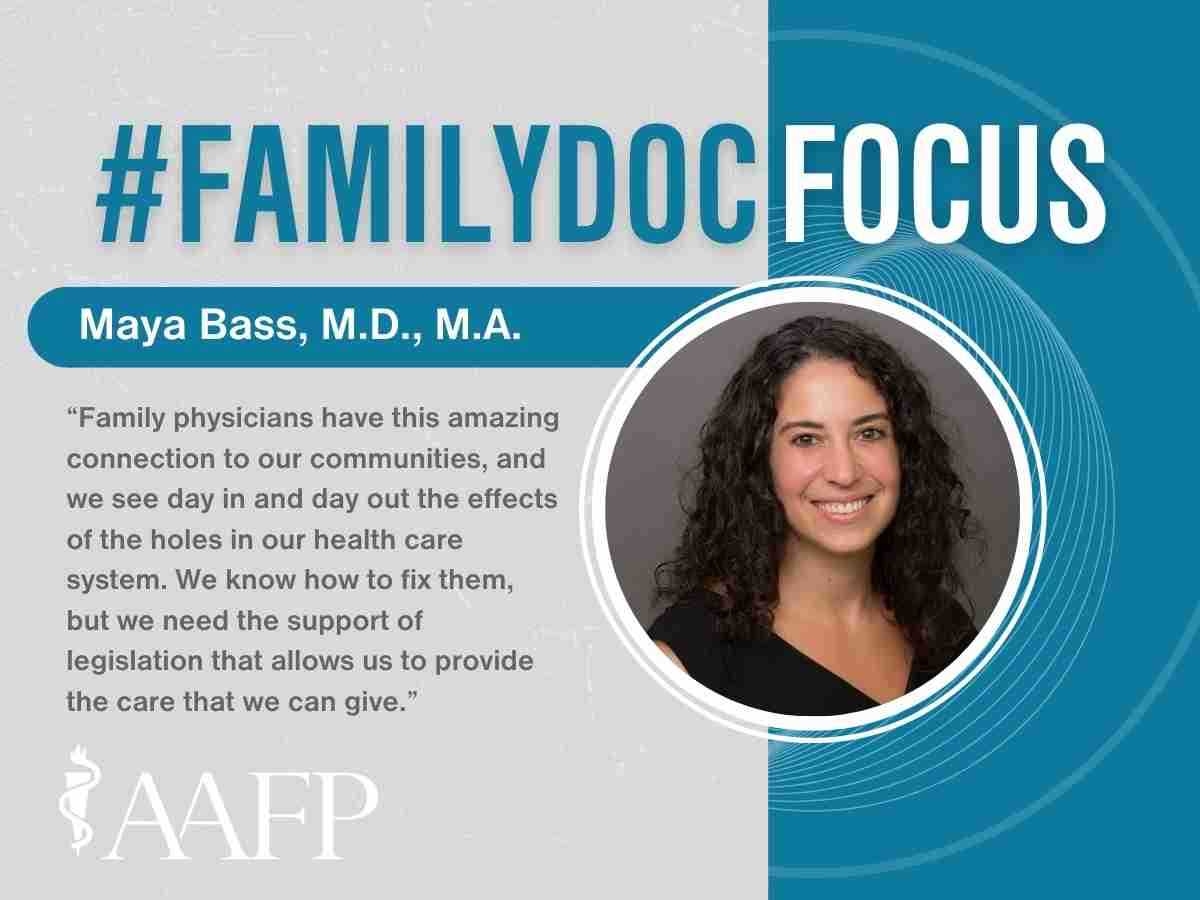Chronic Conditions Forced FMX Presenter to Learn Resilience
July 13, 2022, 4:57 p.m. David Mitchell — Maya Bass, M.D., M.A., will lean on more than just her education, training and nearly a decade of practice experience when she delivers a presentation on resiliency, mindfulness and behavior change to her family medicine peers during the Family Medicine Experience Sept. 20-23 in Washington, D.C.

“Wellness became crucial to my life because I live with multiple chronic medical conditions, which required me to make huge life changes quickly,” said Bass, who was diagnosed with celiac disease during her senior year in college and Crohn’s disease during her first year of medical school. “I did a lot of research and learned a lot of troubleshooting techniques to make behavior changes because I wanted to ensure that I was setting myself up for success. It’s something I feel really passionate about because by making changes, I’ve been able to manage my chronic health conditions and be successful in my career and my personal life. I experienced this personally, so it’s easy for me to translate it into practice for others.”
Bass’s FMX session is designed to teach evidence‐based strategies to build resilience and increase rates of behavior change; help attendees practice self‐compassion and mindfulness-based exercises; and create an action plan to employ behavior change techniques.
The last step, she said, is vital.
“As burnout has become an extremely popular topic and the need to build resiliency in physicians has become increasingly important, some wellness talks have been, like, ‘Try this and this and this and this.’ But very rarely do you get the wellness talk that is, ‘Try this, and this is how you actually add this into your already busy life as a long-lasting new habit without making it feel like an additional burden,’” she said.
Bass said her focus at FMX will be “on the people in the room,” but her presentation also is applicable to patients.
“It’s something I use with patients every day,” she said. “It’s one of those things that is helpful to try yourself first because it makes you better at teaching it to patients. Anything I do for myself regarding wellness is something that my patients likely will benefit from, both because I’m more well and because I can teach them how to feel better, too.”
Bass also has learned resilience during her career. The Philadelphia native started her practice at a federally qualified health center in Enid, Okla., before coming home as an assistant professor of family medicine at Drexel University College of Medicine and assistant program director at Hahnemann University Hospital in 2018.
That hospital closed in 2019, leaving more than 500 residents and fellows in various specialties without accredited programs. The family medicine program survived, however, moving in its entirety to the Tower Health network.
“We actually rebuilt a new program with the same offices, so I’m not new to the concept of building,” said Bass, who stayed at Drexel and Tower until last summer, when she became assistant professor of family and community medicine at Cooper Medical School of Rowan University and associate director of the new Cooper Family Medicine Residency in Camden, N.J.
Family and community medicine chair Bennett Shenker, M.D., M.S., M.S.P.H., filled the role of director during the program’s start-up phase, and Bass was promoted to director in May. Cooper recently welcomed its first class of 10 residents.
“I’m really excited,” she said. “Being a young program director has its ups and downs, but I’m really very lucky in that I have a strong network of mentors who have been wonderful about letting me meet with them on a regular basis during this process.”
Bass will be representing Cooper July 28-30 in Kansas City, Mo., during the National Conference of Family Medicine Residents and Medical Students. The event’s residency fair offers medical students an opportunity to meet residents and faculty from hundreds of family medicine programs.
Bass also will attend as chair of the AAFP’s Reproductive Health Member Interest Group, which will meet during the conference.
“Part of my wellness practice is advocacy work because when we’re hit with barriers, we get frustrated and feel powerless, which can burn you out and lead to moral injury,” she said. “By being an advocate, you get back some of that power because actions you take can have an impact. When a physician walks into a senator’s office and talks to them, that holds weight because we aren’t just one person. We are a person who takes care of an entire panel of their constituents.”
Bass, who has served on a number of committees and task forces for the Pennsylvania AFP, hopes to pass on her passion for advocacy to her residents. Cooper offers a media and advocacy track that will allow residents to focus two of their elective months in those areas.
“Family physicians have this amazing connection to our communities, and we see day in and day out the effects of the holes in our health care system,” she said. “We know how to fix them, but we need the support of legislation that allows us to provide the care that we can give. Family docs can do everything, but it’s really hard to care for a patient when they have no insurance and can’t get medications and can’t get to specialists when they need to.
“If we don’t make the call to Congress about our patients who are directly impacted by our representatives’ actions, who will? Our patients are vulnerable, and many of them are just not in the position to advocate for themselves. They have to focus on handling their chronic conditions or the social determinants of health that make it hard for them to get the care they need. In many ways, we are the perfect person to advocate for them.”